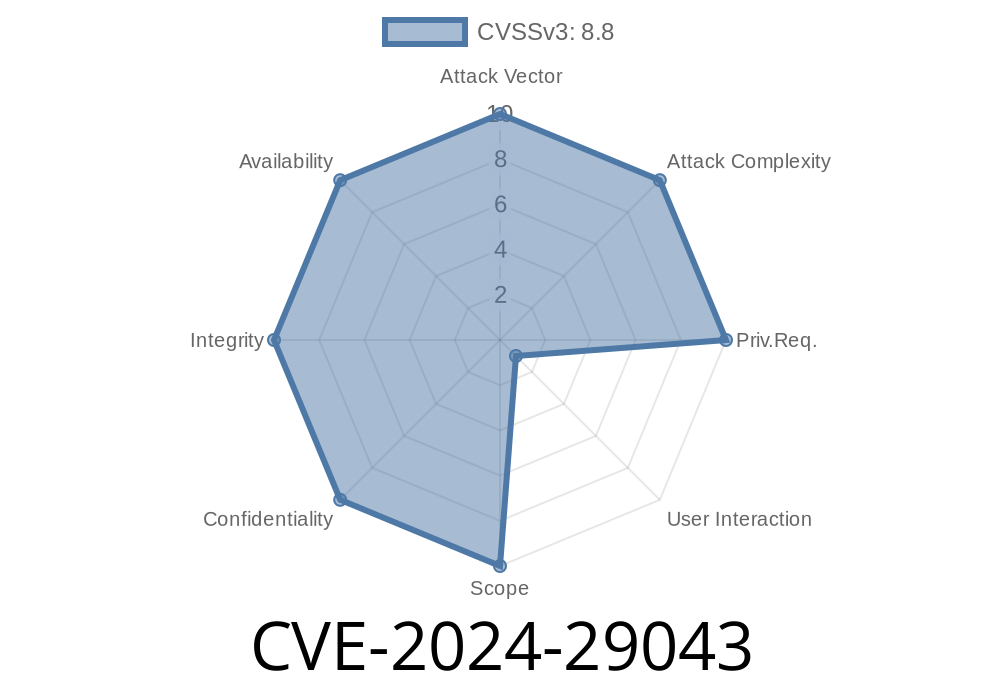In March 2024, Microsoft published a security advisory regarding CVE-2024-29043—a critical remote code execution (RCE) vulnerability in the Microsoft ODBC Driver for SQL Server. Let’s explore this vulnerability in plain language, with code snippets, steps an attacker might use, and links to authoritative sources. You’ll walk away understanding how this bug works and what you should do next.
What is CVE-2024-29043?
CVE-2024-29043 is a vulnerability in Microsoft’s ODBC Driver for SQL Server (msoledbsql, msodbcsql) affects versions before:
Microsoft ODBC Driver 11, 13.1, 13, 17, and 18
This flaw can let attackers execute arbitrary code on the victim’s system, potentially giving them full control.
References
- Microsoft Security Guide for CVE-2024-29043
- NVD Details
Anyone running outdated ODBC drivers on their Windows or Linux machines.
- Applications and servers connecting to SQL Server using these drivers—especially those exposed to untrusted networks or users.
How Does the Vulnerability Work?
The core of the issue is a lack of proper input validation and unsafe handling of connection parameters by the driver. Under the right conditions, an attacker can make the driver process specially crafted data, resulting in code execution.
Attacker delivers a malicious DSN or Connection String
This could be via a phishing email, web app, or any mechanism that influences the parameters passed to the ODBC driver.
Driver processes the string, executes malicious code
The unsafe parsing or dereferencing happens, and arbitrary code runs under the context of the victim process.
A Closer Look (Proof-of-Concept)
Below is a simplified example. Suppose you have a Python application using pyodbc (which imports the vulnerable Microsoft ODBC Driver). The attacker crafts a malicious connection string:
import pyodbc
# Malicious connection string example (simulated)
conn_str = (
"DRIVER={ODBC Driver 18 for SQL Server};"
"SERVER=malicious.example.com;"
"UID=attacker;PWD=secret;"
"TrustServerCertificate=Yes;"
# Crafty parameter below may trigger unsafe behavior in vulnerable driver
"ApplicationIntent='; EXEC xp_cmdshell('calc.exe');--"
)
try:
# This calls into the vulnerable ODBC driver
conn = pyodbc.connect(conn_str)
cursor = conn.cursor()
cursor.execute("SELECT 1")
except Exception as e:
print("Exploit failed:", e)
Note: In an actual attack, the crafted value may leverage undocumented quirks or memory manipulation that triggers the actual code execution path identified by security researchers.
Exploit Scenarios
- Phishing: Victim runs a malicious shortcut, PowerShell script, or batch file containing a crafted connection string.
- Compromised Applications: An application exposes connection string configuration via an HTTP API or config file, and attacker injects payload.
- Remote Access: Attackers deliver a malicious ODBC Data Source Name (DSN) file which, when opened, leverages the exploit.
*Download and install the fixed versions:*
- Microsoft ODBC Driver 17
- Microsoft ODBC Driver 18
Review Application Input Handling:
Ensure applications sanitize and properly validate any input that could become part of a connection string.
More Research & Original References
- Microsoft Security Guide: CVE-2024-29043
- NVD Entry: CVE-2024-29043
- Official ODBC Downloads
Conclusion
CVE-2024-29043 is a powerful RCE affecting critical data access layers. Failing to patch places your apps and users at serious risk. Update now, audit your code, and remember: connection strings deserve the same security treatment as passwords.
Timeline
Published on: 04/09/2024 17:15:57 UTC
Last modified on: 04/10/2024 13:24:00 UTC
